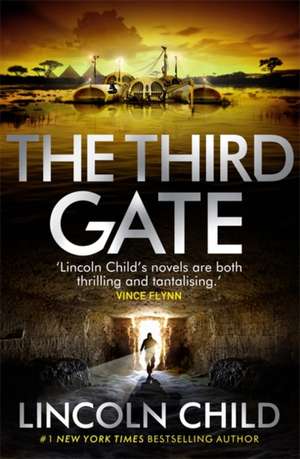The Third Gate
Autor Lincoln Childen Limba Engleză Paperback – 11 dec 2014
Under the direction of renowned explorer Porter Stone, an archaeological team is secretly attempting to locate the tomb of King Narmer, an ancient pharaoh unlike any other. And Stone is anticipating a further discovery, the first of its kind in history: Narmer's famed crown, supposedly possessed of mythical powers, is thought to be buried with him.
The dig is located in the Sudd, a nearly impassable swamp in northern Sudan and one of the most forbidding places on earth. Amid the nightmarish tangle of mud and dead vegetation, a series of harrowing and seemingly inexplicable occurrences has the team living in fear of a centuries-old curse. With a monumental discovery at stake, Professor Jeremy Logan is brought in to investigate. What he finds will raise new questions . . . and alarm.
Praise for Deep Storm
'Harrowing and brilliantly conceived.' Clive Cussler
'Thrilling and tantalizing . . . A fascinating riddle.' Vince Flynn
| Toate formatele și edițiile | Preț | Express |
|---|---|---|
| Paperback (2) | 49.76 lei 3-5 săpt. | +26.47 lei 10-14 zile |
| Little Brown Book Group – 11 dec 2014 | 49.76 lei 3-5 săpt. | +26.47 lei 10-14 zile |
| Anchor Books – 25 feb 2013 | 59.83 lei 3-5 săpt. |
Preț: 49.76 lei
Preț vechi: 64.29 lei
-23% Nou
Puncte Express: 75
Preț estimativ în valută:
9.52€ • 9.97$ • 7.88£
9.52€ • 9.97$ • 7.88£
Carte disponibilă
Livrare economică 15-29 martie
Livrare express 04-08 martie pentru 36.46 lei
Preluare comenzi: 021 569.72.76
Specificații
ISBN-13: 9781472108265
ISBN-10: 1472108264
Pagini: 384
Dimensiuni: 131 x 197 x 31 mm
Greutate: 0.29 kg
Editura: Little Brown Book Group
ISBN-10: 1472108264
Pagini: 384
Dimensiuni: 131 x 197 x 31 mm
Greutate: 0.29 kg
Editura: Little Brown Book Group
Notă biografică
LINCOLN CHILD is the New York Times bestselling author of Terminal Freeze, Deep Storm, and Utopia, as well as co-author with Douglas Preston of numerous international bestsellers in their Pendergast and Gideon Crew series.
Descriere
#1 NEW YORK TIMES BESTSELLING AUTHOR
Extras
1
Three Years Later
Growing up in Westport, currently teaching at Yale, Jeremy Logan thought himself familiar with his home state of Connecticut. But the stretch through which he now drove was a revelation. Heading east from Groton—following the e-mailed directions—he’d turned onto US 1 and then, just past Stonington, onto US 1 Alternate. Hugging the gray Atlantic coastline, he’d passed Wequetequock, rolled over a bridge that looked as old as New England itself, then turned sharply right onto a well-paved but unmarked road. Quite abruptly, the minimalls and tourist motels fell away behind. He passed a sleepy cove in which lobster boats bobbed at anchor, and then entered an equally sleepy hamlet. And yet it was a real village, a working village, with a general store and a tackle shop and an Episcopal church with a steeple three sizes too large, and gray-shingled houses with trim picket fences painted white. There were no hulking SUVs, no out-of-state plates; and the scattering of people sitting on benches or leaning out of front windows waved to him as he passed. The April sunlight was strong, and the sea air had a clean, fresh bite to it. A signboard hanging from the doorframe of the post office informed him he was in Pevensey Point, population 182. Something about the place reminded him irresistibly of Herman Melville.
“Karen,” he said, “if you’d seen this place, you’d never have made us buy that summer cottage in Hyannis.”
Although his wife had died of cancer years ago, Logan still allowed himself to converse with her now and then. Of course it was usually—though not always—more monologue than conversation. At first, he’d been sure to do it only when he was certain not to be overheard. But then—as what had started as a kind of intellectual hobby for him turned increasingly into a profession—he no longer bothered to be so discreet. These days, judging by what he did for a living, people expected him to be a little strange.
Two miles beyond the town, precisely as the directions indicated, a narrow lane led off to the right. Taking it, Logan found himself in a sandy forest of thin scrub pine that soon gave way to tawny dunes. The dunes ended at a metal bridge leading to a low, broad island jutting out into Fishers Island Sound. Even from this distance, Logan could see there were at least a dozen structures on the island, all built of the same reddish-brown stone. At the center were three large five-story buildings that resembled dormitories, arranged in parallel, like dominos. At the far end of the island, partly concealed by the various structures, was an empty airstrip. And beyond everything lay the ocean and the dark green line of Rhode Island.
Logan drove the final mile, stopping at a gatehouse before the bridge. He showed the printed e-mail to the guard inside, who smiled and waved him through. A single sign beside the gatehouse, expensive looking but unobtrusive, read simply cts.
He crossed the bridge, passed an outlying structure, and pulled into a parking lot. It was surprisingly large: there were at least a hundred cars and space for as many more. Nosing into one of the spots, he killed the engine. But instead of exiting, he paused to read the e-mail once again.
Jeremy,
I’m pleased—and relieved—to hear of your acceptance. I also appreciate your being flexible, since as I mentioned earlier there’s no way yet to know how long your investigation will take. In any case you’ll receive a minimum of two weeks’ compensation, at the rate you specified. I’m sorry I can’t give you more details at this point, but you’re probably used to that. And I have to tell you I can’t wait to see you again after all this time.
Directions to the Center are below. I’ll be waiting for you on the morning of the 18th. Any time between ten and noon will be fine. One other thing: once you’re on board with the project, you might find it hard to get calls out with any degree of certainty, so please be sure you’ve cleared your decks before you arrive. Looking forward to the 18th!
Best,
E. R.
Logan glanced at his watch: eleven thirty. He turned the note over once in his hands. You might find it hard to get calls out with any degree of certainty. Why was that? Perhaps cell phone towers had never made it beyond picturesque Pevensey Point? Nevertheless, what the e-mail said was true: he was “used to that.” He pulled a duffel bag from the passenger seat, slipped the note into it, and got out of the car.
Located in one of the central dormitory-like buildings, Reception was an understated space that reminded Logan of a hospital or clinic: a half-dozen empty chairs, tables with magazines and journals, a sprinkling of anonymous-looking oil paintings on beige walls, and a single desk occupied by a woman in her mid-thirties. The letters CTS were set into the wall behind her, once again with no indication of what they might stand for.
Logan gave his name to the woman, who in response looked at him with a mixture of curiosity and uneasiness. He took a seat in one of the vacant chairs, expecting a protracted wait. But no sooner had he picked up a recent issue of Harvard Medical Review than a door across from the receptionist opened and Ethan Rush emerged.
“Jeremy,” Rush said, smiling broadly and extending his hand. “Thank you so much for coming.”
“Ethan,” Logan replied, shaking the proffered hand. “Nice to see you again.”
He hadn’t seen Rush since their days at Johns Hopkins twenty years before, when he’d been doing graduate studies and Rush had been attending the medical school. But the man who stood before him retained a remarkable youthfulness. Only a fine tracery of lines at the corners of his eyes bore testament to the passage of years. And yet in the simple act of shaking the man’s hand, Logan had received two very clear impressions from Rush: a shattering, life-changing event and an unswerving, almost obsessive, devotion to a cause.
Dr. Rush glanced around the reception area. “You brought your luggage?”
“It’s in my trunk.”
“Give me the keys, I’ll see that somebody retrieves it for you.”
“It’s a Lotus Elan S four.”
Rush whistled. “The roadster? What year?”
“Nineteen sixty-eight.”
“Very nice. I’ll make sure they treat it with kid gloves.”
Logan dug into his pocket and handed the keys to Rush, who in turn gave them to the receptionist with some whispered instructions. Then he turned and motioned Logan to follow him through the open doorway.
Taking an elevator to the top floor, Rush led the way down a long hallway that smelled faintly of cleaning fluid and chemicals. The resemblance to a hospital grew stronger—and yet it seemed to be a hospital without patients; the few people they passed were dressed in street clothes, ambulatory, and obviously healthy. Logan peered curiously into the open doorways as they walked by. He saw conference rooms, a large, empty lecture hall with seats for at least a hundred, laboratories bristling with equipment, what appeared to be a reference library full of paperbound journals and dedicated terminals. More strangely, he noticed several apparently identical rooms, each containing a single, narrow bed with literally dozens—if not hundreds—of wires leading to nearby monitoring instruments. Other doors were closed, their small windows covered by privacy curtains. A group of men and women in white lab coats passed them in the hallway. They glanced at Logan, nodded to Rush.
Stopping before a door marked director, Rush opened it and beckoned Logan through an anteroom housing two secretaries and a profusion of bookcases into a private office beyond. It was tastefully decorated, as minimalist as the outer office was crowded. Three of the walls held spare postmodernist paintings in cool blues and grays; the fourth wall appeared to be entirely of glass, covered at the moment by blinds.
In the center of the room was a teakwood table, polished to a brilliant gleam and flanked by two leather chairs. Rush took one and ushered Logan toward the other.
“Can I offer you anything?” the director asked. “Coffee, tea, soda?”
Logan shook his head.
Rush crossed one leg over the other. “Jeremy, I have to be frank. I wasn’t sure you’d be willing to take on this assignment, given how busy you are . . . and how closemouthed I was concerning the particulars.”
“You weren’t sure—even given the fee I charged?”
Rush smiled. “It’s true—your fee is certainly healthy. But then your, ah, work has become somewhat high profile recently.” He hesitated. “What is it you call your profession again?”
“I’m an enigmalogist.”
“Right. An enigmalogist.” Rush glanced curiously at Logan. “And it’s true you were able to document the existence of the Loch Ness monster?”
“You’d have to take that up with my client for that particular assignment, the University of Edinburgh.”
“Serves me right for asking.” Rush paused. “Speaking of universities, you are a professor, aren’t you?”
“Medieval history. At Yale.”
“And what do they think of your other profession at Yale?”
“High visibility is never a problem. It helps guarantee a large admissions pool.” Logan glanced around the office. He’d often found that new clients preferred to talk about his past accomplishments. It postponed discussion of their own problems.
“I remember those . . . investigations you did at the Peabody Institute and the Applied Physics Lab back in school,” Rush said. “Who would have thought they’d lead you to this?”
“Not me, certainly.” Logan shifted in his seat. “So. Care to tell me just what CTS stands for? Nothing around here seems to give any clue.”
“We do keep our cards pretty close to our vest. Center for Transmortality Studies.”
“Transmortality Studies,” Logan repeated.
Rush nodded. “I founded CTS two years ago.”
Logan glanced at him in surprise. “You founded the Center?”
Rush took a deep breath. A grim look came over his face. “You see, Jeremy, it’s like this. Just over three years ago, I was working an ER shift when my wife, Jennifer, was brought in by paramedics. She’d been in a terrible accident and was completely unresponsive. We tried everything—heart massage, paddles—but it was hopeless. It was the worst moment of my life. There I was, not only unable to save my own wife . . . but I was expected to pronounce her dead, as well.”
Logan shook his head in sympathy.
“Except that I didn’t. I couldn’t bring myself to do it. Against the advice of the assisting doctors I continued heroic measures.” He leaned forward. “And, Jeremy—she pulled through. I finally revived her, fourteen minutes after all brain function had ceased.”
“How?”
Three Years Later
Growing up in Westport, currently teaching at Yale, Jeremy Logan thought himself familiar with his home state of Connecticut. But the stretch through which he now drove was a revelation. Heading east from Groton—following the e-mailed directions—he’d turned onto US 1 and then, just past Stonington, onto US 1 Alternate. Hugging the gray Atlantic coastline, he’d passed Wequetequock, rolled over a bridge that looked as old as New England itself, then turned sharply right onto a well-paved but unmarked road. Quite abruptly, the minimalls and tourist motels fell away behind. He passed a sleepy cove in which lobster boats bobbed at anchor, and then entered an equally sleepy hamlet. And yet it was a real village, a working village, with a general store and a tackle shop and an Episcopal church with a steeple three sizes too large, and gray-shingled houses with trim picket fences painted white. There were no hulking SUVs, no out-of-state plates; and the scattering of people sitting on benches or leaning out of front windows waved to him as he passed. The April sunlight was strong, and the sea air had a clean, fresh bite to it. A signboard hanging from the doorframe of the post office informed him he was in Pevensey Point, population 182. Something about the place reminded him irresistibly of Herman Melville.
“Karen,” he said, “if you’d seen this place, you’d never have made us buy that summer cottage in Hyannis.”
Although his wife had died of cancer years ago, Logan still allowed himself to converse with her now and then. Of course it was usually—though not always—more monologue than conversation. At first, he’d been sure to do it only when he was certain not to be overheard. But then—as what had started as a kind of intellectual hobby for him turned increasingly into a profession—he no longer bothered to be so discreet. These days, judging by what he did for a living, people expected him to be a little strange.
Two miles beyond the town, precisely as the directions indicated, a narrow lane led off to the right. Taking it, Logan found himself in a sandy forest of thin scrub pine that soon gave way to tawny dunes. The dunes ended at a metal bridge leading to a low, broad island jutting out into Fishers Island Sound. Even from this distance, Logan could see there were at least a dozen structures on the island, all built of the same reddish-brown stone. At the center were three large five-story buildings that resembled dormitories, arranged in parallel, like dominos. At the far end of the island, partly concealed by the various structures, was an empty airstrip. And beyond everything lay the ocean and the dark green line of Rhode Island.
Logan drove the final mile, stopping at a gatehouse before the bridge. He showed the printed e-mail to the guard inside, who smiled and waved him through. A single sign beside the gatehouse, expensive looking but unobtrusive, read simply cts.
He crossed the bridge, passed an outlying structure, and pulled into a parking lot. It was surprisingly large: there were at least a hundred cars and space for as many more. Nosing into one of the spots, he killed the engine. But instead of exiting, he paused to read the e-mail once again.
Jeremy,
I’m pleased—and relieved—to hear of your acceptance. I also appreciate your being flexible, since as I mentioned earlier there’s no way yet to know how long your investigation will take. In any case you’ll receive a minimum of two weeks’ compensation, at the rate you specified. I’m sorry I can’t give you more details at this point, but you’re probably used to that. And I have to tell you I can’t wait to see you again after all this time.
Directions to the Center are below. I’ll be waiting for you on the morning of the 18th. Any time between ten and noon will be fine. One other thing: once you’re on board with the project, you might find it hard to get calls out with any degree of certainty, so please be sure you’ve cleared your decks before you arrive. Looking forward to the 18th!
Best,
E. R.
Logan glanced at his watch: eleven thirty. He turned the note over once in his hands. You might find it hard to get calls out with any degree of certainty. Why was that? Perhaps cell phone towers had never made it beyond picturesque Pevensey Point? Nevertheless, what the e-mail said was true: he was “used to that.” He pulled a duffel bag from the passenger seat, slipped the note into it, and got out of the car.
Located in one of the central dormitory-like buildings, Reception was an understated space that reminded Logan of a hospital or clinic: a half-dozen empty chairs, tables with magazines and journals, a sprinkling of anonymous-looking oil paintings on beige walls, and a single desk occupied by a woman in her mid-thirties. The letters CTS were set into the wall behind her, once again with no indication of what they might stand for.
Logan gave his name to the woman, who in response looked at him with a mixture of curiosity and uneasiness. He took a seat in one of the vacant chairs, expecting a protracted wait. But no sooner had he picked up a recent issue of Harvard Medical Review than a door across from the receptionist opened and Ethan Rush emerged.
“Jeremy,” Rush said, smiling broadly and extending his hand. “Thank you so much for coming.”
“Ethan,” Logan replied, shaking the proffered hand. “Nice to see you again.”
He hadn’t seen Rush since their days at Johns Hopkins twenty years before, when he’d been doing graduate studies and Rush had been attending the medical school. But the man who stood before him retained a remarkable youthfulness. Only a fine tracery of lines at the corners of his eyes bore testament to the passage of years. And yet in the simple act of shaking the man’s hand, Logan had received two very clear impressions from Rush: a shattering, life-changing event and an unswerving, almost obsessive, devotion to a cause.
Dr. Rush glanced around the reception area. “You brought your luggage?”
“It’s in my trunk.”
“Give me the keys, I’ll see that somebody retrieves it for you.”
“It’s a Lotus Elan S four.”
Rush whistled. “The roadster? What year?”
“Nineteen sixty-eight.”
“Very nice. I’ll make sure they treat it with kid gloves.”
Logan dug into his pocket and handed the keys to Rush, who in turn gave them to the receptionist with some whispered instructions. Then he turned and motioned Logan to follow him through the open doorway.
Taking an elevator to the top floor, Rush led the way down a long hallway that smelled faintly of cleaning fluid and chemicals. The resemblance to a hospital grew stronger—and yet it seemed to be a hospital without patients; the few people they passed were dressed in street clothes, ambulatory, and obviously healthy. Logan peered curiously into the open doorways as they walked by. He saw conference rooms, a large, empty lecture hall with seats for at least a hundred, laboratories bristling with equipment, what appeared to be a reference library full of paperbound journals and dedicated terminals. More strangely, he noticed several apparently identical rooms, each containing a single, narrow bed with literally dozens—if not hundreds—of wires leading to nearby monitoring instruments. Other doors were closed, their small windows covered by privacy curtains. A group of men and women in white lab coats passed them in the hallway. They glanced at Logan, nodded to Rush.
Stopping before a door marked director, Rush opened it and beckoned Logan through an anteroom housing two secretaries and a profusion of bookcases into a private office beyond. It was tastefully decorated, as minimalist as the outer office was crowded. Three of the walls held spare postmodernist paintings in cool blues and grays; the fourth wall appeared to be entirely of glass, covered at the moment by blinds.
In the center of the room was a teakwood table, polished to a brilliant gleam and flanked by two leather chairs. Rush took one and ushered Logan toward the other.
“Can I offer you anything?” the director asked. “Coffee, tea, soda?”
Logan shook his head.
Rush crossed one leg over the other. “Jeremy, I have to be frank. I wasn’t sure you’d be willing to take on this assignment, given how busy you are . . . and how closemouthed I was concerning the particulars.”
“You weren’t sure—even given the fee I charged?”
Rush smiled. “It’s true—your fee is certainly healthy. But then your, ah, work has become somewhat high profile recently.” He hesitated. “What is it you call your profession again?”
“I’m an enigmalogist.”
“Right. An enigmalogist.” Rush glanced curiously at Logan. “And it’s true you were able to document the existence of the Loch Ness monster?”
“You’d have to take that up with my client for that particular assignment, the University of Edinburgh.”
“Serves me right for asking.” Rush paused. “Speaking of universities, you are a professor, aren’t you?”
“Medieval history. At Yale.”
“And what do they think of your other profession at Yale?”
“High visibility is never a problem. It helps guarantee a large admissions pool.” Logan glanced around the office. He’d often found that new clients preferred to talk about his past accomplishments. It postponed discussion of their own problems.
“I remember those . . . investigations you did at the Peabody Institute and the Applied Physics Lab back in school,” Rush said. “Who would have thought they’d lead you to this?”
“Not me, certainly.” Logan shifted in his seat. “So. Care to tell me just what CTS stands for? Nothing around here seems to give any clue.”
“We do keep our cards pretty close to our vest. Center for Transmortality Studies.”
“Transmortality Studies,” Logan repeated.
Rush nodded. “I founded CTS two years ago.”
Logan glanced at him in surprise. “You founded the Center?”
Rush took a deep breath. A grim look came over his face. “You see, Jeremy, it’s like this. Just over three years ago, I was working an ER shift when my wife, Jennifer, was brought in by paramedics. She’d been in a terrible accident and was completely unresponsive. We tried everything—heart massage, paddles—but it was hopeless. It was the worst moment of my life. There I was, not only unable to save my own wife . . . but I was expected to pronounce her dead, as well.”
Logan shook his head in sympathy.
“Except that I didn’t. I couldn’t bring myself to do it. Against the advice of the assisting doctors I continued heroic measures.” He leaned forward. “And, Jeremy—she pulled through. I finally revived her, fourteen minutes after all brain function had ceased.”
“How?”
Recenzii
“Lincoln Child’s novels are thrilling and tantalizing.”
—Vince Flynn
"By mixing fact and fiction as well as science and the occult, Lincoln Child once again has created an offbeat thriller that is both exciting and thoughtprovoking."
--The Free Lance-Star
"Bestseller Child (Terminal Freeze) more than succeeds in making a mummy's curse terrifying in this superb supernatural thriller...Child evokes fear through understatement...Readers will hope to see more of [lead character] Logan in a sequel."
--Publishers Weekly (starred review)
"Ample gadgetry, New Age soul-shifting, and pyrotechnics sufficient to employ a stable of stuntmen when brought to film: Child’s newest is the sort of thing to delight all those who got wrapped up in The Mummy. Think, a Dan Brown-ian adventure amongst Pharaohs ready with a pocket full of curses."
--Kirkus
"Its characters are well drawn, and the mystery is nicely handled, keeping readers guessing as to whether something supernatural is going on here. Of the author’s solo novels, this could be the best so far."
--Booklist
—Vince Flynn
"By mixing fact and fiction as well as science and the occult, Lincoln Child once again has created an offbeat thriller that is both exciting and thoughtprovoking."
--The Free Lance-Star
"Bestseller Child (Terminal Freeze) more than succeeds in making a mummy's curse terrifying in this superb supernatural thriller...Child evokes fear through understatement...Readers will hope to see more of [lead character] Logan in a sequel."
--Publishers Weekly (starred review)
"Ample gadgetry, New Age soul-shifting, and pyrotechnics sufficient to employ a stable of stuntmen when brought to film: Child’s newest is the sort of thing to delight all those who got wrapped up in The Mummy. Think, a Dan Brown-ian adventure amongst Pharaohs ready with a pocket full of curses."
--Kirkus
"Its characters are well drawn, and the mystery is nicely handled, keeping readers guessing as to whether something supernatural is going on here. Of the author’s solo novels, this could be the best so far."
--Booklist









![Pierre and His People, [Tales of the Far North], Volume 1.](https://i1.books-express.ro/bt/9783842461369/pierre-and-his-people-tales-of-the-far-north-volume-1.jpg)
![Pierre and His People, [Tales of the Far North], Volume 2.](https://i2.books-express.ro/bt/9783842461376/pierre-and-his-people-tales-of-the-far-north-volume-2.jpg)

